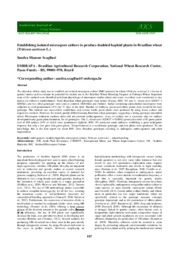Establishing isolated microspore culture to produce doubled haploid plants in Brazilian wheat (Triticum aestivum L.).
Establishing isolated microspore culture to produce doubled haploid plants in Brazilian wheat (Triticum aestivum L.).
Author(s): SCAGLIUSI, S. M. M.
Summary: The objective of this study was to establish an isolated microspore culture (IMC) protocol in wheat (Triticum aestivum L.) for use in genetic studies and to evaluate its potential for routine use in the Brazilian Wheat Breeding Program at Embrapa Wheat. Important steps of the method were identified and plant physiology of microspore mother plants and ovary co-culture were considered as key factors for effective establishment. Three Brazilian wheat genotypes were tested (Toropi, BRS 194 and F1 wheat cross 020037 × 020062), and two other genotypes were used as controls (Bobwhite and Fielder). Spikes containing uninucleated microspores were subjected to cold pretreatment (4°C) for 21 days in the dark. Number of embryos, green and albino plants were recorded for each genotype. The method was successfully established, and several fertile green plants were produced by using tissue culture and responsive controls. However, the results greatly differed among Brazilian wheat genotypes, suggesting a strong genotype-dependent effect. Microspore induction medium alone did not promote embryogenesis; ovary co-culture was a necessary step for embryo development and green plant formation, for all genotypes. The F1 wheat cross (020037 × 020062) produced a total of 85 green plants (out of 108 spikes), 64% of which were spontaneous diploids. BRS 194 produced many embryos, exhibiting a good androgenic response, but only a few grew into green plants. Toropi behaved as a recalcitrant genotype, and zero plants were produced. To our knowledge, this is the first report on wheat IMC from Brazilian genotypes resulting in androgenic embryogenesis and plant regeneration.
Publication year: 2014
Types of publication: Journal article
Unit: Embrapa Wheat
Observation
Some of Embrapa's publications are published as ePub files. To read them, use or download one of the following free software options to your computer or mobile device. Android: Google Play Books; IOS: iBooks; Windows and Linux: Calibre.
Access other publications
Access the Agricultural Research Database (BDPA) to consult Embrapa's full library collection and records.
Visit Embrapa Bookstore to purchase books and other publications sold by Embrapa.

